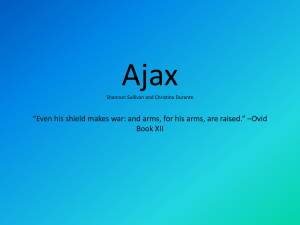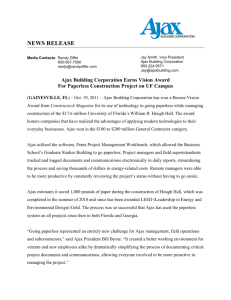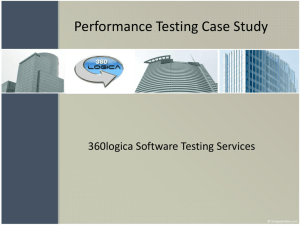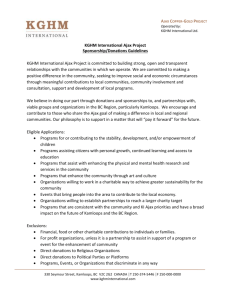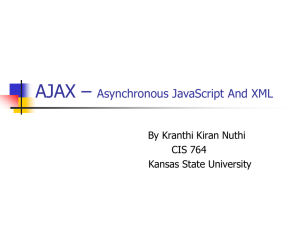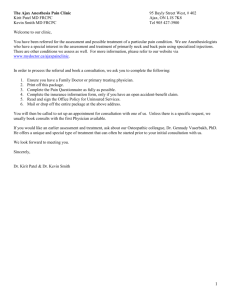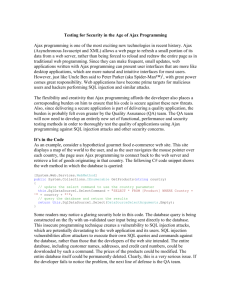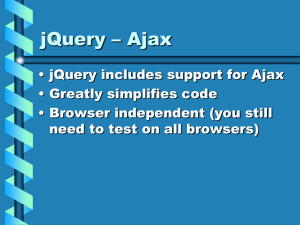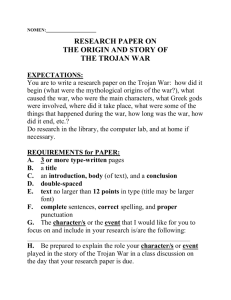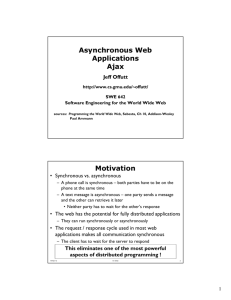METU Computer Engineering
advertisement
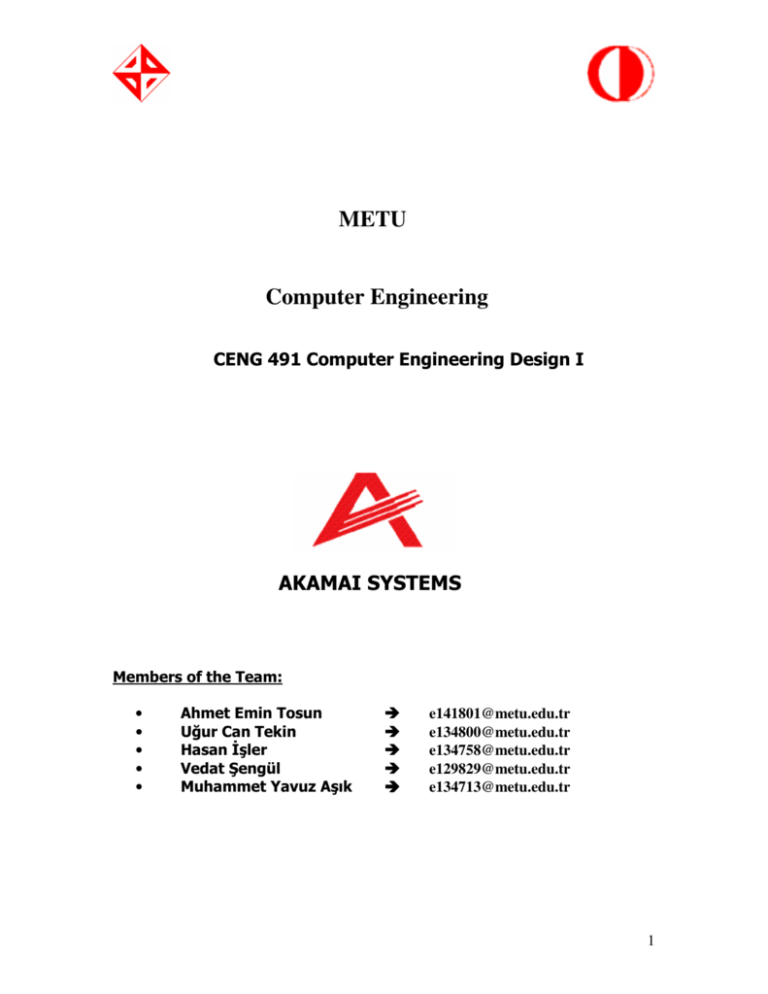
METU Computer Engineering CENG 491 Computer Engineering Design I AKAMAI SYSTEMS Members of the Team: • • • • • Ahmet Emin Tosun Uğur Can Tekin Hasan İşler Vedat Şengül Muhammet Yavuz Aşık e141801@metu.edu.tr e134800@metu.edu.tr e134758@metu.edu.tr e129829@metu.edu.tr e134713@metu.edu.tr 1 Part I: 1.1 Company Name Part II: 2.1 Members of the Team Part III: 3.1 Project topic Part IV: 4.1 Possible Application Areas Part V: 5.1 Initial Ideas For Project and Possible Features to be Developed 2 Part I: 1.1 Company Name: Akamai Systems Part II: 2.1 Members of the Team: Ahmet Emin Tosun Uğur Can Tekin Hasan İşler Vedat Şengül Muhammet Yavuz Aşık • • • • • Optimist & Devil’s Advocate Recorder & Summarizer Initiator Project Leader Gatekeeper & Timekeeper Part III: 3.1 Project topic: Developers Studio for Ajax AJAX stands for Asynchronous JavaScript And XML and is a web development technique for creating interactive web applications. AJAX is not a technology in itself, but a term that refers to the use of a group of technologies together. Ajax’s most appealing characteristic, however, is its asynchronous nature, which means it can do all of this without having to refresh the page. This allows you to update portions of a page based upon user events. With AJAX, we only get the data from the server that we absolutely need, not the whole page. More importantly, data can be posted to and retrieved from the server after the entire page is loaded. This can be leveraged in creative and powerful ways to create a more fluid browsing experience. It can send as well as receive information in a variety of formats, including XML, HTML, and even text files. The technologies that are used to build AJAX web applications encompass a number of different programming domains, so AJAX development is neither as straightforward as regular applications development, nor as easy as old web development. Here’s a brief listing of the technologies that work together to make an AJAX web application: • • • • • XML the W3C DOM (Document Object Model) CSS XMLHttpRequest Javascript The building blocks of these applications are work in conjunction with a component that allows the browser to communicate with the server programmatically (XMLHttpRequest), and we have what is now being referred to as AJAX. 3 In this project, we are going to implement a graphical development environment for web pages with Ajax. The users of our product will be able to write new scripts and also edit them within the HTML files. The program will let users to add and remove AJAX actions to modify web components. Debugging scripts will also be a feature of the product. We should implement the server-side actions in order to have opportunity to execute the written scripts. For instance, while executing a script that is connecting to the database, our program must do appropriate actions to handle this. In other words, the local host should be implemented. Possible Application Areas: AJAX development is such an enormous leap forward for web development: instead of having to send everything to the server in a single, huge mass, then wait for the server to send back a new page for rendering, web developers can communicate with the server in smaller chunks, and selectively update specific areas of the page based on the server’s responses to those requests. There are several of application areas for our design. They can be listed as: o Program can be used by e-commerce sites, because in commerce the looking is very important. If your web site looks like something from last year, you're likely to fall behind in consumer perception. So the page must be enhanced nearly everyday. And by our program it will be easy and fast to enhance web page. o Highly interactive applications areas where an application is highly interactive, it may provide benefits to use AJAX to allow the interactivity without the time cost of page reloads. A good example of a highly interactive web site is Google Maps. o Visualizing large datasets on the web can be difficult but with AJAX it’s possible to show a view on the data, and simply load more in as needed. Again, Google Maps is a great example. o Internal web sites the bandwidth is much higher so more AJAX usage can be successful. It’s often the case that intranets involve working with data, and this is often a good application for AJAX. o AJAX is best used in key places throughout a web site where it adds significant value. There is little or no value in using AJAX to provide the 4 majority of your page content – you may lose browser compatibility make the application overly complex and cause problems with the site being indexed in search engines. o With AJAX it’s possible to validate the data the user enters, while they are entering it. They can then receive feedback (using the server’s intelligence) without the page being posted back. For example an email validation field could check if the email address is valid using the DNS, without the user knowing. o Online wizards - linear user interfaces that collect a large series of data are a well-known challenge in web applications, and can be implemented using AJAX in a way where the user feels more in control and the application is more responsive. Initial Ideas For Project and Possible Features to be Developed: Our program may have these features; * User will be able to create and edit scripts with in the HTML files. * User will be able to add and remove the Ajax reactions to modify the web components. * The most important feature is that the program will supply an understandable debug component so that the user can be able to debug the scripts that he wrote and can find easily the wrong and inefficiency. * In order to have full support for executing the scripts, the server-side actions will be implemented. Initial ideas for our product; * Our project would support a rich user interface. * Our Project will be a useful tool for Ajax users. It will be easy to use and see your errors. * Choosing Java as language might help us on designing the interface. * We can talk with the companies that are dealing with web design for requirements. 5

